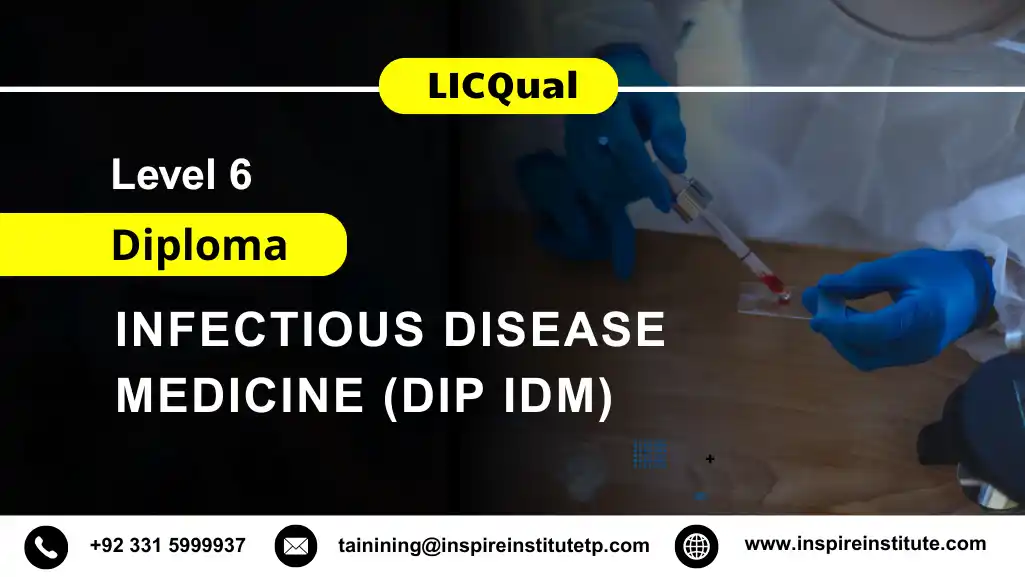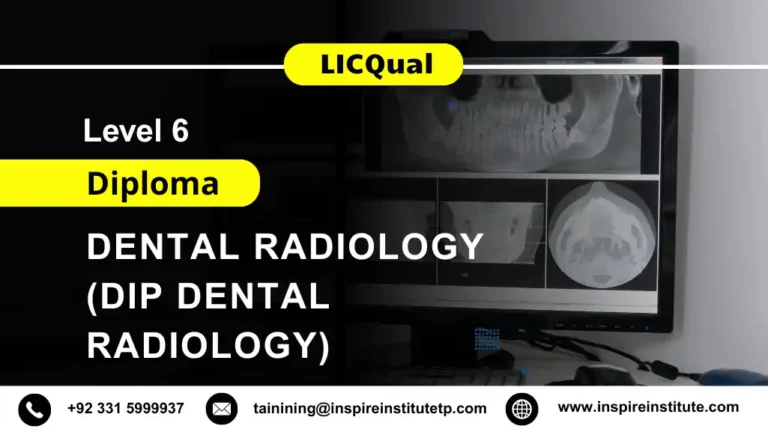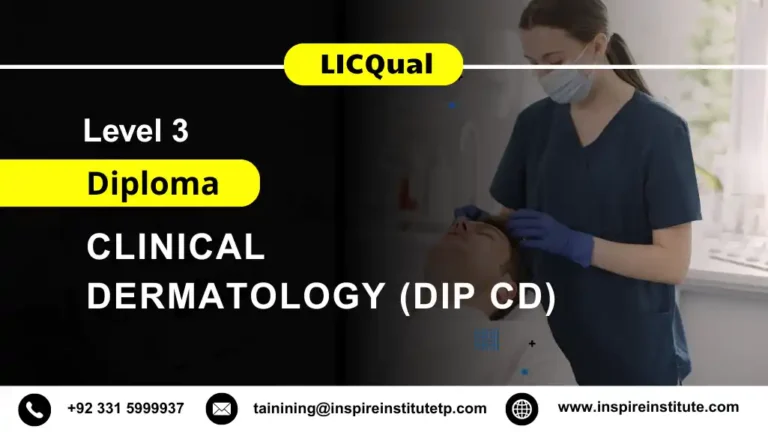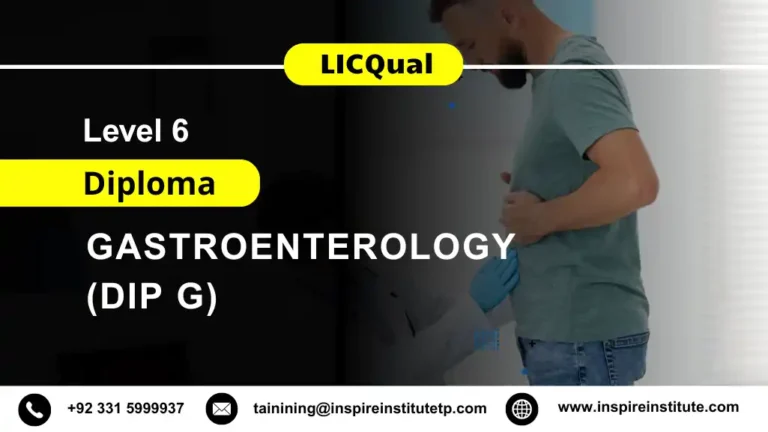LICQual Level 6 Diploma in Infectious Disease Medicine (Dip IDM)
The LICQual Level 6 Diploma in Infectious Disease Medicine (Dip IDM) is a UK-accredited qualification designed for healthcare professionals, clinicians, and medical researchers who seek to deepen their understanding of infectious diseases and strengthen their expertise in disease prevention, control, and treatment. In an era where global health challenges continue to rise, this advanced diploma provides learners with the essential knowledge and practical competencies to manage infectious outbreaks, develop clinical strategies, and contribute meaningfully to public health resilience.
The course delivers a comprehensive foundation in epidemiology, microbiology, immunology, and clinical infectious disease management, equipping learners to recognise, diagnose, and respond to a broad spectrum of communicable diseases. Through evidence-based learning and real-world case studies, participants gain the ability to apply theoretical concepts to complex clinical and community health scenarios, bridging the gap between medical science and practical intervention.
The LICQual Level 6 Diploma in Infectious Disease Medicine (Dip IDM) not only builds professional capability but also fosters a sense of global responsibility. It empowers healthcare professionals to play a pivotal role in combating infectious diseases, improving patient care, and safeguarding public health through advanced knowledge, research-driven practice, and ethical clinical leadership.
Why Choose this Qualification
The LICQual Level 6 Diploma in Infectious Disease Medicine (Dip IDM) is a globally recognised UK-accredited qualification designed to equip healthcare professionals with advanced expertise in the identification, prevention, and management of infectious diseases. In today’s interconnected world, infectious disease control has become a crucial public health priority, and this diploma offers learners the scientific insight, analytical skills, and clinical competence needed to address these challenges effectively. It bridges academic theory with real-world medical applications, ensuring graduates can contribute meaningfully to the global fight against infectious diseases while advancing their own careers in healthcare and medicine.
Key Reasons to Choose this Qualification
1. Advanced Understanding of Infectious Diseases
This diploma provides a deep and structured understanding of infectious disease mechanisms and management.
- Gain in-depth knowledge of microbiology, virology, and immunology.
- Understand disease transmission, pathogenesis, and epidemiological trends.
- Learn to interpret and apply clinical guidelines for infection control.
- Acquire the ability to recognise and manage emerging and re-emerging infections.
- Develop critical thinking in diagnosing and treating communicable diseases effectively.
2. Practical and Evidence-Based Learning
Learners benefit from an applied, assignment-based approach that promotes evidence-based practice.
- Engage in practical case studies and real-world clinical scenarios.
- Apply theoretical knowledge to disease investigation and outbreak response.
- Strengthen analytical and diagnostic skills through guided assignments.
- Learn to evaluate research findings and integrate them into practice.
- Gain confidence in managing infection control and prevention strategies.
3. Globally Recognised and Accredited Qualification
The LICQual Level 6 Diploma in Infectious Disease Medicine (Dip IDM) is widely respected and aligned with UK educational standards.
- Earn a qualification accredited by a reputable UK awarding body.
- Demonstrate international competence in infectious disease medicine.
- Enhance your professional credibility in healthcare and clinical settings.
- Access new career pathways in global health and epidemiology.
- Build a qualification recognised by hospitals, universities, and health organisations worldwide.
4. Flexible and Accessible Learning Pathway
Designed for professionals with busy schedules, this course offers a flexible learning structure.
- Study at your own pace through an assignment-based format.
- Balance academic advancement with clinical or professional responsibilities.
- Receive expert academic guidance and mentorship throughout the programme.
- Access online learning materials and interactive resources 24/7.
- Benefit from a supportive and globally accessible learning platform.
5. Career Advancement Opportunities
This qualification opens diverse career opportunities across healthcare, research, and public health sectors.
- Pursue roles such as Infectious Disease Specialist, Epidemiologist, or Clinical Researcher.
- Qualify for leadership positions in hospitals, laboratories, and global health programmes.
- Strengthen credentials for roles in policy-making and infection control management.
- Enhance eligibility for postgraduate or doctoral studies in related medical fields.
- Increase employability in international healthcare and humanitarian organisations.
6. Focus on Public Health and Global Health Preparedness
The course aligns with modern global health goals and sustainability frameworks.
- Learn to assess and respond to infectious disease outbreaks globally.
- Gain insight into health surveillance, vaccination programmes, and pandemic control.
- Develop the ability to lead multidisciplinary teams during health emergencies.
- Understand global health systems and international health regulations.
- Contribute to building resilient and equitable public health systems.
7. Development of Research and Analytical Skills
Learners develop advanced analytical and research skills applicable across healthcare disciplines.
- Conduct and evaluate research related to infectious disease medicine.
- Learn to analyse epidemiological data and identify health trends.
- Use evidence-based reasoning in clinical and public health decisions.
- Gain proficiency in academic writing and professional reporting.
- Build a scientific approach to continuous learning and professional growth.
8. Ethical and Compassionate Medical Practice
This qualification reinforces the values of ethics, empathy, and professionalism in infectious disease management.
- Understand the ethical implications of infectious disease control and treatment.
- Promote equitable healthcare access and patient-centred care.
- Build awareness of cultural sensitivity in healthcare delivery.
- Strengthen moral decision-making in medical and research contexts.
- Uphold the principles of safety, confidentiality, and humanitarian responsibility.
In summary, the LICQual Level 6 Diploma in Infectious Disease Medicine (Dip IDM) is more than an academic qualification—it is a professional advancement pathway for those dedicated to combating infectious diseases and improving global health standards. By combining rigorous theoretical training with real-world applications, this diploma empowers healthcare professionals to lead with knowledge, compassion, and excellence in an ever-evolving medical landscape. practice worldwide.
Course Overview
LICQual UK Awarding Body
Average Completion Time:
6-24 Months
Study Units: 6 Units
Evidence & Assignment Based
Mandatory Units
Who Should Take This Course
The LICQual Level 6 Diploma in Infectious Disease Medicine (Dip IDM) is an advanced UK-accredited qualification designed for healthcare professionals and aspiring medical specialists committed to combating infectious diseases and improving public health outcomes. This programme Infectious Disease Medicine equips learners with the knowledge, analytical abilities, and clinical expertise needed to address global health threats, manage infection control, and promote evidence-based healthcare practices. By combining theoretical knowledge with applied learning, the diploma caters to professionals seeking to expand their impact in healthcare, research, and community health leadership.
This course is suitable for
1. Medical Practitioners and Physicians
This diploma is ideal for doctors and medical officers seeking to deepen their expertise in infectious disease diagnosis and management.
- Strengthen clinical decision-making in infection control and treatment.
- Gain advanced understanding of microbiology, virology, and immunopathology.
- Learn to manage emerging and re-emerging infectious diseases effectively.
- Apply evidence-based medicine in clinical and public health contexts.
- Enhance professional competence for leadership roles in healthcare institutions.
2. Nurses and Allied Health Professionals
Designed for registered nurses, clinical officers, and allied health practitioners dedicated to improving patient outcomes.
- Acquire advanced knowledge in infection prevention and control.
- Develop skills in patient education, care coordination, and outbreak response.
- Learn to support multidisciplinary healthcare teams during disease management.
- Apply infection control measures to ensure patient and community safety.
- Build the ability to lead nursing initiatives in infectious disease care.
3. Public Health Professionals and Epidemiologists
This qualification supports public health experts aiming to design and implement effective health interventions.
- Learn to collect, analyse, and interpret epidemiological data.
- Develop expertise in surveillance systems and outbreak investigation.
- Understand health promotion, vaccination strategies, and disease control programmes.
- Gain proficiency in policy development and health communication.
- Contribute to local and global infectious disease prevention initiatives.
4. Laboratory Scientists and Microbiologists
Ideal for medical laboratory technologists and microbiologists seeking deeper analytical and diagnostic skills.
- Gain expertise in laboratory diagnosis of infectious diseases.
- Learn advanced techniques in microbiological and molecular testing.
- Understand biosafety, sample management, and infection transmission mechanisms.
- Enhance quality assurance practices within clinical laboratories.
- Collaborate effectively with clinicians in diagnostic and surveillance programmes.
5. Health Administrators and Policy Makers
Suitable for healthcare leaders and managers focusing on strengthening public health systems.
- Develop skills in strategic planning and health system management.
- Understand the economic and policy aspects of infectious disease control.
- Learn to manage public health resources during epidemics and pandemics.
- Formulate policies aligned with global health frameworks and standards.
- Promote effective leadership and governance in health organisations.
6. Researchers and Academics in Medical Sciences
Designed for those pursuing a research-oriented career in infectious disease medicine.
- Conduct advanced research in epidemiology, immunology, and health policy.
- Learn to design and analyse clinical or community-based research projects.
- Gain expertise in publishing scientific work and presenting academic findings.
- Build competencies in data analysis and interpretation of medical research.
- Contribute to advancing global knowledge in disease prevention and treatment.
7. International Health and NGO Professionals
Perfect for professionals involved in humanitarian work and global health initiatives.
- Develop knowledge of international health systems and disease control frameworks.
- Learn to implement infection control measures in resource-limited settings.
- Understand global health security, emergency preparedness, and response.
- Collaborate with international agencies to support global disease eradication efforts.
- Build cultural competence for effective cross-border health management.
8. Recent Graduates in Health and Life Sciences
An excellent choice for graduates aspiring to enter the healthcare or public health sector.
- Build foundational understanding of infectious disease management and control.
- Develop analytical and critical thinking skills applicable in healthcare settings.
- Gain exposure to real-world clinical and epidemiological case studies.
- Prepare for future specialisation or postgraduate study in medical sciences.
- Strengthen employability across global health organisations and research institutions.
The LICQual Level 6 Diploma in Infectious Disease Medicine (Dip IDM) is ideal for healthcare professionals, researchers, and emerging medical leaders dedicated to advancing their expertise in infectious diseases and global health. By completing this qualification, Infectious Disease Medicine learners not only gain valuable clinical and analytical skills but also become empowered to lead innovative healthcare solutions that protect and enhance community health worldwide.
Course Benefits
The LICQual Level 6 Diploma in Infectious Disease Medicine (Dip IDM) is a UK-accredited qualification designed for healthcare professionals, clinicians, and aspiring health specialists seeking to enhance their knowledge and skills in managing infectious diseases. This assignment-based diploma integrates scientific understanding with real-world clinical applications, enabling learners to diagnose, treat, and prevent infectious conditions effectively. Through evidence-based learning and practical case studies, the programme equips professionals to respond to public health challenges with precision, confidence, and global competence.
Key Benefits of the Course
- Specialist Knowledge:
Gain in-depth knowledge of infectious disease medicine, including microbiology, virology, immunology, and epidemiology. Learners explore the mechanisms of infection, antimicrobial resistance, and global disease control measures. The LICQual Level 6 Diploma in Infectious Disease Medicine (Dip IDM) also covers advanced topics such as outbreak management, vaccination strategies, and health surveillance systems. This ensures learners are equipped with the theoretical and clinical expertise to manage infectious diseases effectively across healthcare settings. - Practical Application:
Develop strong practical skills through real-world simulations, diagnostic case analyses, and applied learning. Learners gain hands-on experience in interpreting laboratory data, managing infection control protocols, and applying clinical decision-making models. The course enables learners to work confidently within multidisciplinary teams to address complex disease scenarios, from community infections to hospital-acquired outbreaks. - Recognised Qualification:
Earn a globally respected UK-accredited qualification that validates your professional capability in infectious disease management. The LICQual Level 6 Diploma in Infectious Disease Medicine (Dip IDM) is recognised internationally, meeting high healthcare education standards. This qualification strengthens professional credibility and opens opportunities in hospitals, research centres, government agencies, and international health organisations. - Flexible Learning Pathway:
Designed for working professionals, the flexible, assignment-based structure allows learners to study at their own pace while maintaining clinical or research responsibilities. The programme provides access to online learning materials, academic mentorship, and structured guidance. This enables learners to balance education and professional practice effectively while enhancing their expertise in infectious disease medicine. - Evidence-Based Training:
The course emphasises the use of scientific evidence and global research in infection control and disease prevention. Learners engage with the latest literature, WHO guidelines, and international case studies to develop critical evaluation and research skills. This evidence-based approach prepares graduates to implement validated clinical and public health interventions for managing infectious diseases worldwide. - Career Development:
This qualification opens diverse career opportunities in healthcare, clinical research, epidemiology, and global health leadership. Graduates may pursue roles such as Infectious Disease Specialist, Clinical Researcher, Epidemiologist, or Infection Control Coordinator. The diploma Infectious Disease Medicine also provides a strong foundation for postgraduate study or professional advancement within the medical and health sciences fields. - Enhanced Public Health Impact:
Learners are trained to design and implement effective infection prevention and control strategies that protect communities and health systems. The LICQual Level 6 Diploma in Infectious Disease Medicine (Dip IDM) fosters an understanding of ethical, cultural, and global factors influencing disease transmission and management. Graduates are equipped to lead initiatives that improve healthcare quality and promote sustainable health outcomes. - Professional Growth:
Strengthen your clinical leadership, analytical, and communication skills—essential for effective infectious disease management. The course Infectious Disease Medicine encourages reflective learning, ethical decision-making, and collaboration across disciplines. Graduates emerge as confident and competent healthcare professionals prepared to address global health challenges through innovation and clinical excellence.
The LICQual Level 6 Diploma in Infectious Disease Medicine (Dip IDM) empowers healthcare professionals to become leaders in infection control, disease prevention, and medical research. By combining advanced scientific knowledge with practical applications, this qualification enhances career potential and contributes significantly to global healthcare resilience and community well-being.nd public well-being worldwide.ntal health services and patient outcomes worldwide.
Eligibility Criteria
The LICQual Level 6 Diploma in Infectious Disease Medicine (Dip IDM) is a UK-accredited qualification designed for healthcare professionals, clinicians, laboratory specialists, and public health practitioners seeking to enhance their expertise in infectious diseases. This assignment-based diploma combines scientific theory with real-world applications, enabling learners to diagnose, manage, and prevent infectious diseases effectively. The programme develops professional competence in epidemiology, microbiology, and infection control while preparing learners to address global health threats with confidence and skill.
Educational Background:
Applicants should possess a recognised qualification in medicine, nursing, microbiology, biomedical sciences, or a related healthcare discipline. A Level 5 diploma or equivalent qualification in infectious disease, health sciences, or medical laboratory technology may also be accepted. International applicants holding equivalent medical or health qualifications will be evaluated individually to ensure alignment with UK academic standards.
Professional Experience:
A minimum of one year of professional experience in clinical practice, infectious disease management, microbiology, or public health is recommended. Candidates with experience in disease surveillance, laboratory diagnostics, or infection prevention programs are particularly suited for this qualification. However, motivated individuals with a strong academic background and interest in infectious disease medicine are also encouraged to apply.
Age Requirement:
Applicants must be at least 18 years of age at the time of enrolment. This requirement ensures learners have the maturity, ethical awareness, and sense of professional responsibility essential for advanced medical and scientific studies.
Language Proficiency:
As the course is taught entirely in English, learners must demonstrate strong language proficiency in reading, writing, and communication. Non-native English speakers are advised to have a minimum IELTS score of 6.0 or an equivalent qualification to engage effectively in assignments, discussions, and research-based assessments.
Technical Requirements:
Learners should have access to a personal computer or laptop with a stable internet connection to participate in online study sessions, access course resources, and submit assignments. Basic computer literacy—particularly in research, data analysis, and document preparation—is essential for academic success in the LICQual Level 6 Diploma in Infectious Disease Medicine (Dip IDM) programme.
Required Documents:
Applicants are required to provide the following documents during the admission process:
A valid ID card or passport for identity verification.
Certified copies of academic transcripts or certificates of previous qualifications.
Proof of professional experience in healthcare, clinical practice, or laboratory work (if applicable).
The Qualification Process
LICQual Level 6 Diploma in Infectious Disease Medicine (Dip IDM) follows a structured pathway to ensure learners gain comprehensive knowledge, practical skills, and professional competence in community oral healthcare.
Step 1: Self-Assessment
Learners review the entry requirements to confirm eligibility. Candidates with a background in dentistry, oral health, or public health are encouraged to apply.
Step 2: Registration
Complete the registration process by submitting required documents such as proof of qualifications, a valid ID, and payment of enrollment fees.
Step 3: Induction
An induction session is conducted to:
- Verify learner eligibility and documentation.
- Introduce study materials, learning outcomes, and assessment procedures.
Step 4: Learning and Evidence Submission
Learners complete assignments, case studies, and practical exercises demonstrating competence in public health dentistry, community oral health assessment, preventive strategies, and program planning.
Step 5: Feedback and Revision
Assessors review submitted evidence and provide constructive feedback. Learners can revise and resubmit work to meet all required standards.
Step 6: Competence Validation
Final submissions are evaluated to confirm that learners have met all theoretical and practical learning outcomes.
Step 7: Internal Quality Assurance (IQA)
The IQA team reviews the assessment process to ensure accuracy, fairness, and compliance with international standards.
Step 8: External Verification (EQA)
External verifiers validate the authenticity and quality of learner achievements.
Step 9: Certification
Upon successful verification, learners are awarded LICQual Level 6 Diploma in Infectious Disease Medicine (Dip IDM), demonstrating advanced proficiency in community oral healthcare and preparing them for professional growth in dental public health, preventive dentistry, and healthcare policy.







